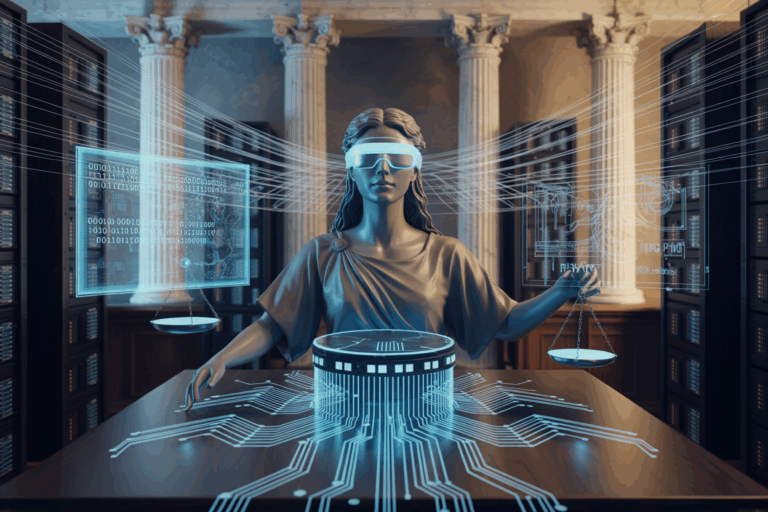HaystackID Launches Deepfake Detection Suite and Expands AI-Driven Discovery Tools for Law Firms
The eDiscovery provider unveils four AI-focused initiatives, including technology to authenticate digital evidence and combat synthetic media in legal proceedings.
HaystackID, a Chicago-based eDiscovery and legal technology provider, announced on October 1, 2025, a suite of new AI-driven capabilities aimed at addressing emerging challenges in digital evidence authentication, cloud-based review, and data migration. The announcement positions the company as a major player in the rapidly growing legal technology market, which is projected to reach $72.5 billion by 2035, up from $35.4 billion this year.
The company unveiled four concurrent initiatives: the launch of the HaystackID VALID Suite for identifying deepfakes and authenticating digital media, integrated access to Relativity aiR workflows through the company’s CoreFlex platform, new legacy data migration services to RelativityOne, and continued physical expansion into the United Kingdom with additional London offices and staff.
Addressing the Deepfake Problem in Litigation
The centerpiece of HaystackID’s announcement is its Verification and Legal Identification/Authentication of Digital Media (VALID) Suite, designed to help legal teams identify, authenticate, and defend against manipulated images, video, and audio evidence. As synthetic media and AI-generated content become more sophisticated, courts and litigators face growing challenges in verifying the authenticity of digital evidence.
“A deepfake inquiry isn’t simply an image check, it’s a comprehensive evidentiary examination,” said John Wilson, chief information security officer and president of forensics at HaystackID. “We’ve designed HaystackID VALID with scientific rigor. Every capability has been engineered for legal, regulatory and investigative defensibility, supported by secure handling protocols and complete documentation from intake to testimony.”
The VALID Suite combines forensic analytics, standardized workflows, and court-ready reporting to provide what the company describes as defensible authentication of digital media. The tool arrives as deepfake technology becomes increasingly accessible and concerns mount about manipulated evidence entering courtrooms.
AI-Powered Review Integration and Cloud Migration
HaystackID also announced that its CoreFlex platform now includes integrated access to Relativity aiR workflows, the AI-driven review technology from Relativity. The integration has earned CoreFlex a finalist nomination in the 2025 Relativity Innovation Awards, to be presented at Relativity Fest in Chicago from October 7-9.
“The combination of CoreFlex and Relativity aiR addresses the growing demand by legal teams seeking efficiency, control and real-time insights across every stage of the e-discovery process,” said Hal Brooks, chief executive officer at HaystackID. “We’re seeing clients dramatically improve processing times and reduce manual intervention by leveraging the automation and AI capabilities of our joint solutions.”
In addition, the company launched end-to-end data migration services to help legal teams move from Relativity Server and legacy review platforms to RelativityOne, Relativity’s cloud-based platform. The service, offered on a fixed-fee basis, is designed to enable immediate access to cloud performance and AI-powered review capabilities. According to HaystackID, the migration can reduce review time by up to 80%.
Separate UK Expansion Continues
As a fourth pillar of growth, HaystackID announced continued expansion in the United Kingdom, opening new London offices and hiring additional staff to meet growing client demand. The expanded team will focus on supporting clients in digital forensics and legal discovery within the UK’s specific compliance and privacy requirements.
The company has brought on Matthew Hamilton, a digital forensics investigator with 12 years of experience at the Metropolitan Police in London, as part of this expansion.
Market Context and Industry Growth
The announcements come amid rapid expansion in the legal technology sector. According to Ryan O’Leary, research director for privacy and legal technology at IDC, “The adoption of AI across the legal industry continues to grow at a record pace, especially as corporate legal teams focus on getting more value from outside counsel at lower costs. By integrating advanced, AI-driven intelligence into discovery and case analysis, legal teams can enhance efficiency and improve outcomes while staying compliant in today’s evolving regulatory and litigation environment.”
A report by Future Market Insights projects the legal technology market will more than double over the next decade, driven largely by AI adoption and cloud-based discovery tools. HaystackID’s multi-pronged announcement reflects broader industry trends toward AI-assisted review, automated workflows, enhanced data analytics, and international service expansion.
Implications for Legal Practice
The deepfake authentication capability addresses a growing evidentiary concern. As generative AI tools become more sophisticated, courts will increasingly face questions about the authenticity of digital evidence. Tools like the VALID Suite could become essential for both challenging and defending digital evidence, potentially creating new obligations for attorneys to verify media authenticity before admission.
The integration of Relativity aiR into CoreFlex reflects the ongoing shift toward AI-assisted document review. While these tools promise significant efficiency gains and cost reductions, they also raise questions about attorney oversight, quality control, and compliance with competence requirements under rules like Model Rule 1.1.
For firms still operating on legacy review platforms, HaystackID’s migration services highlight the pressure to modernize. Cloud-based platforms with AI capabilities are rapidly becoming industry standard, and firms using older systems may face competitive disadvantages in large-scale discovery matters.
My Take
Deepfake evidence will become one of the most contentious issues in litigation. The real problem won’t be lawyers intentionally manipulating evidence; it will be third parties, clients, or even opposing witnesses introducing AI-generated content that looks legitimate until it’s too late. As tools like VALID emerge, courts will have to decide whether AI authentication becomes a new threshold for admissibility or just another layer of expert testimony. Either way, verifying what’s “real” in the evidentiary chain could soon rival discovery itself in cost and complexity.
The rise of deepfakes won’t just challenge evidence, it will redefine competition in the legal industry itself. Tools like HaystackID’s VALID are the first wave of what’s coming: an arms race of AI capabilities inside law firms. The firms that experiment broadly, integrate multiple AI systems across practice areas, and build cohesive frameworks rather than piecemeal tools will dominate. One-stop-shop platforms may serve smaller practices for now, but they’ll soon feel like blunt instruments in an increasingly complex AI landscape. The future of law will belong to those who treat AI not as a plug-in, but as infrastructure.
Read the original press release
Disclaimer
JurisIQ provides news and analysis on AI tools and legal technology developments. We do not endorse specific products or services. All coverage of AI tools includes transparent disclosure of our editorial approach. Attorneys should independently evaluate any technology for compliance with applicable ethics rules and jurisdictional requirements. Read our full editorial policy.


